【精选】2019八年级英语上册 Unit 2 How often do you exercise(语法篇)试题 (新版)人教新目标版练习
八年级上册Unit 2 How often do you exercise?知识点总结

八年级上册Unit2How o ften do you exercise?知识点归纳【词汇讲解】1.full【语境激活】Next week is quite full for me.【解析】full是形容词,意为“满的”、“忙的”、“饱的”。
常用短语be full of,意为“充满...”。
如:包里装满了衣服。
The bag is full of clothes.【例句】He could only nod because his mouth was full.He smiled,and his eyes are also full of laughter.他微笑着,眼睛里也充满了笑意。
2.health【语境激活】She says it's good for my health.【解析】health不可数名词,意为“健康”;healthy是形容词“健康的”,常见搭配k eep healthy。
【例题】用所给词的适当形式填空。
A_____(health)bod y is very important for every one.W e tak e exercise to keep______(health).Smoking is bad for our_______(healthy).3.percent【语境激活】W e found that only fifteen percent of our students exercise every day.【解析】意为“百分之...”,为单位词,不能使用复数形式。
“百分数+of+名词”作主语,其谓语动词的单复数情况视后面的名词来定。
如果是可数名词复数,谓语动词用复数形式;如果是单数名词或不可数名词,谓语动词用单数形式。
【例句】T wenty percent of the students agr ee with you.百分之二十的学生赞同你Thirty percent of time passes.百分之三十的时间过去了.【例题】用所给词的适当形式填空。
八年级英语上册Unit2Howoftendoyouexercise语法小结素材人教新目标版
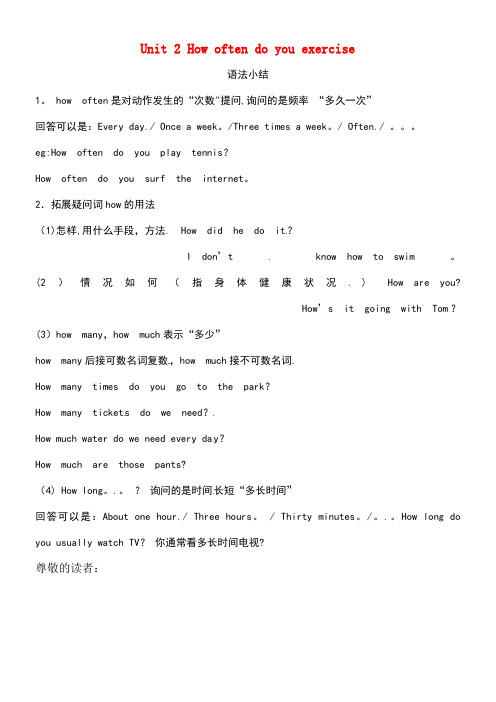
Unit 2 How often do you exercise语法小结1。
how often是对动作发生的“次数"提问,询问的是频率“多久一次”回答可以是:Every day./ Once a week。
/Three times a week。
/ Often./ 。
eg:How often do you play tennis?How often do you surf the internet。
2.拓展疑问词how的用法(1)怎样,用什么手段,方法. How did he do it?I don’t know how to swim。
(2)情况如何(指身体健康状况) How are you?How’s it going with Tom?(3)how many,how much表示“多少”how many后接可数名词复数,how much接不可数名词.How many times do you go to the park?How many tickets do we need?How much water do we need every da y?How much are those pants?(4) How long。
.。
?询问的是时间长短“多长时间”回答可以是:About one hour./ Three hours。
/ Thirty minutes。
/。
.。
How long do you usually watch TV?你通常看多长时间电视?尊敬的读者:本文由我和我的同事在百忙中收集整编出来,本文稿在发布之前我们对内容进行仔细校对,但是难免会有不尽如人意之处,如有疏漏之处请指正,希望本文能为您解开疑惑,引发思考。
文中部分文字受到网友的关怀和支持,在此表示感谢!在往后的日子希望与大家共同进步,成长。
This article is collected and compiled by my colleagues and I in our busy schedule. We proofread the content carefully before the release of this article, but it is inevitable that there will be some unsatisfactory points. If there are omissions, please correct them. I hope this article can solve your doubts and arouse your thinking. Part of the text by the user's care and support, thank you here! I hope to make progress and grow with you in the future.。
2019年秋八年级英语上册 Unit 2 How often do you exercise?人教新目标版

2b Listen again. Match the activities in 2a
with how often Cheng Tao does them.
Activities a. go to the movies b. watch TV c. shop d. exercise e. read
How often every day once a week twice a week
2. w__a_t_c_h_T__V__ 3. e_x_e_r_c_i_s_e___ 4. r_e_a_d__a__b_o_o_k 5. g_o__s_h_o_p_p_i_n_g
I often play soccer.
What do you do on weekends?
What does Alice do on weekends?
three times a week
once a month twice a month
How often do you do these
2c activities? Fill in the chart and
then make conversations.
Activities
How often
watch TV use the Internet read English books go to the movies exercise
She often helps with housework.
频率副词
•always意为 “总是”, 表示动作的重复或状态的 延续。 •usually意为 “通常”, 表示很少有例外。 •often意为 “经常”, 表示动作的重复, 但不如 usually那么频繁, 中间有间断。 •sometimes意为 “有时”, 表示动作偶尔发生。 •hardly意为 “几乎不”, 常和ever连用表示强调。 •never意为 “从未”。
八年级英语上册Unit2Howoftendoyouexercise短语语法知识点汇总新版人教新目标版【经典版】.doc

Unit 2 How often do you exercise一、必背短语。
【教材内容解析】Section A1.What do you usually do on weekends? (P. 9)on weekends意为“在周末”,泛指每个周末,on the weekend则表示“在这个周末”,特指某个周末;在英式英语中,在周末也可以用at the weekend或者at weekends。
I like going fishing on weekends.He wants to do something special on the weekend.2.help with homework (P. 9)help表示“帮助”时,常用的句型为:help sb. with sth. 帮助某人某事;help sb. (to) do sth.帮助某人做某事。
Can you help me with my homework?He often helps his mother clean do housework.3.sometimes (P. 9)sometimes是频度副词,意为“有时”,相当于at times。
I sometimes play computer games on weekends.【拓展】辨析sometimes, some times, sometime与some timehardly ever (P. 9)hardly作副词,表示“几乎不”;hard用作副词表示“努力地、猛烈地”,作形容词表示“硬的、困难的”。
He hardly works.He works hard.This is a hard work.5.How often do you watch TV?(P. 9)how often意为“多久一次”用来提问频率,常用表示频率的副词或者短语来回答,如twice a week, sometimes, every day, always等。
八年上Unit2 How often do you exercise

Unit2 How often do you exercise单元重点单词housework ['haʊswɜːk] n.家务劳动hardly ['hɑːdli] adv.几乎不;简直不;刚刚ever ['evə(r)] adv.曾经;在任何时候once [wʌns] adv.一次;曾经twice [twaɪs] adv.两倍;两次Internet ['ɪntənet] n.因特网program ['prəʊɡræm] n.节目;程序;课程;节目单full [fʊl] adj.满的;充满的;完全的swing [swɪŋ] n.摇摆;秋千v.摇摆;旋转maybe ['meɪbi] adv.或许;也许;可能swing dance摇摆舞least [liːst] adj.最小的;最少的at least至少hardly ever很少;几乎从不;难得junk n.垃圾;废旧杂物coffee ['kɒfi] n.咖啡;咖啡色health [helθ] n.健康;人的身体或精神状态result [rɪ'zʌlt] .结果;后果percent [pə'sent] adj.百分之...的online [ˌɒn'laɪn] adj.在线的adv.在线地television ['telɪvɪʒn] n.电视机;电视节目although [ɔːl'ðəʊ] conj.虽然;尽管;然而;可是through [θruː] prep.穿过;凭借;一直到body ['bɒdi] n.身体mind [maɪnd] .头脑;想法;意见;心思such [sʌtʃ] adj.这样的;如此的together [tə'ɡeðə(r)] adv.共同;一起die [daɪ] v.死;枯竭;消失writer ['raɪtə(r)] n.作者;作家dentist ['dentɪst] n.牙科医生magazine ['mæɡəziːn] n.杂志however [haʊ'evə(r)] adv.然而;无论如何;不管多么than [ðən] conj.比almost ['ɔːlməʊst] adv.几乎;差不多none [nʌn] pron.没有人;没有任何东西,毫无less [les] adj.更少的;较少的point [pɔɪnt] n.看法;要点;重点;小数点;目标;分数单元重点短语such as例如;诸如junk food n.垃圾食品;无营养食品more than超过;多于;不仅仅;非常less than不到;少于help with housework 帮助做家务on weekends 在周末how often 多久一次hardly ever 几乎从不once a week 每周一次twice a month 每月两次every day 每天be free 有空go to the movies 去看电影use the Internet 用互联网swing dance 摇摆舞play tennis 打网球stay up late 熬夜;睡得很晚at least 至少have dance and piano lessons 上舞蹈课和钢琴课go to bed early 早点睡觉play sports 进行体育活动be good for 对……有好处go camping 去野营not…at all 一点儿也不……in o ne’s free time 在某人的业余时间the most popular 最受欢迎的such as 比如;诸如old habits die hard 积习难改go to the dentist 去看牙医morn than 多于;超过less than 少于help sb. with sth. 帮助某人做某事How about…? ......怎么样?want sb. to do sth. 想让某人做某事How many+可数名词复数+一般疑问句?……有多少……?spend time with sb. 和某人一起度过时光It’s+ adj.+ to do sth. 做某事的……的。
初二英语上册Unit 2 How often do you exercise_知识点总结-人教新目标版
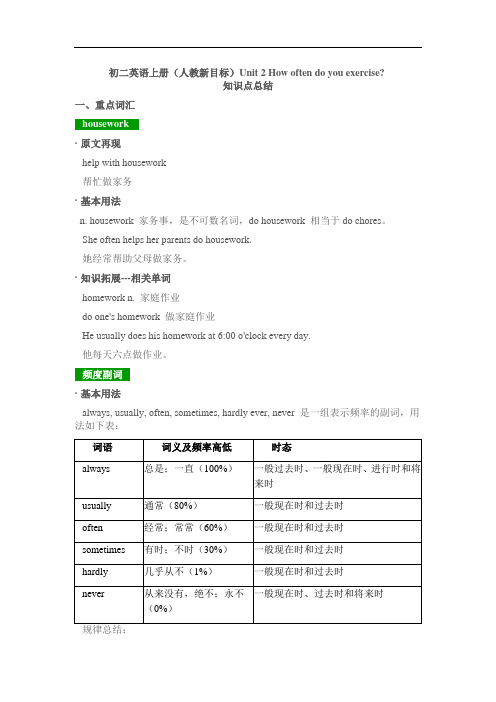
初二英语上册(人教新目标)Unit 2 How often do you exercise?知识点总结一、重点词汇·原文再现help with housework帮忙做家务·基本用法n. housework 家务事,是不可数名词,do housework 相当于do chores。
She often helps her parents do housework.她经常帮助父母做家务。
·知识拓展---相关单词homework n. 家庭作业do one's homework 做家庭作业He usually does his homework at 6:00 o'clock every day.他每天六点做作业。
·基本用法always, usually, often, sometimes, hardly ever, never 是一组表示频率的副词,用法如下表:1. 这些副词在句子中的位置基本相同,一般放在助动词、be动词或情态动词之后,行为动词之前。
2. hardly和never均为否定副词,有二者的句子不需再加no或not构成否定,因其本身就是否定句。
3. 就这些表示拼读的副词提问时,常用how often。
·知识拓展---词义辨析hard/hardly1. hard可充当形容词和副词两种角色。
(1)用作形容词有“硬的”,“困难的、艰难的”的意思。
其中用作“难的”讲时,在口语中与difficult通用。
The problem is too hard, I can't work it out.这个问题太难了,我算不出来。
(2)用作副词,意为“努力地、刻苦地”,“猛烈地”,hard用作“猛烈地”讲时,同heavily相同。
He works hard only before exams.他只在考试前努力学习。
It is raining hard outside. You can't go out.外面正下着大雨。
八年级英语上册Unit-2-How-often-do-you-exercise知识点归纳

八年级英语上册Unit 2 How often do you exercise知识点归纳八年级英语上册Unit 2 How often do you exercise知识点归纳一、词组、短语:1、help with housework 帮助做家务活,2、go shopping 购物,3、on weekends 在周末,4、how often 多久一次,5、hardly ever几乎不,6、once a week 每周一次,7、twice a month每月二次,8、go to the movies去看电影,9、every day 每天,10、use the Internet上网/用网,11、be free有空,12、have dance and piano lessons 上舞蹈钢琴课,13、swing dance摇摆舞14、play tennis 打网球,15、stay up late熬夜,16、at least至少,17、go to bed early 早睡,18、 play sports 锻炼身体,19、be good for 对…有好处,20、go camping去野营,21、in one’s free time 在某人的空闲时间,22、not….at all 根本不,23、the most popular 最流行,24、such as例如,25、go to the dentist去看牙医,26、more than 超过/多于,27、Old habits die hard.旧习惯难改。
28、 hard=difficult 困难的,29、less than 少于/不到二、重要句子(语法):What do you usually do on weekends你周末通常做什么 I always exercise.总是锻炼身体。
What do they do on weekends他们周末干什么 They often help with housework.他们经常帮助干家务活。
人教版八年级上册英语Unit2How often do you exercise知识点
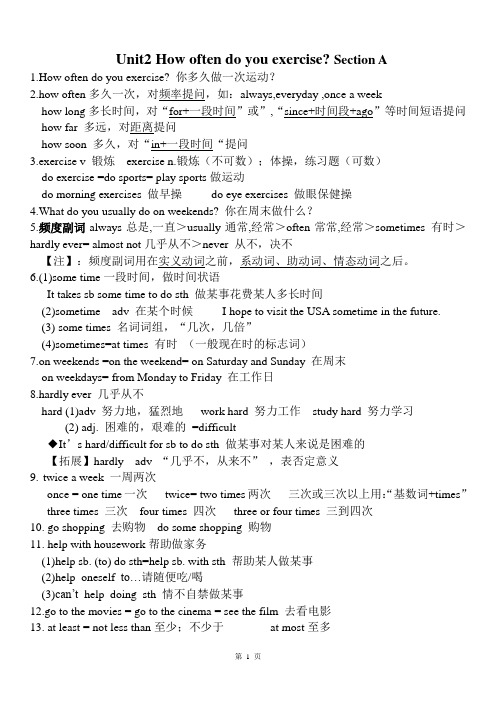
Unit2 How often do you exercise? Section A1.How often do you exercise? 你多久做一次运动?2.how often多久一次,对频率提问,如:always,everyday ,once a weekhow long多长时间,对“for+一段时间”或”,“since+时间段+ago”等时间短语提问how far 多远,对距离提问how soon 多久,对“in+一段时间“提问3.exercise v 锻炼exercise n.锻炼(不可数);体操,练习题(可数)do exercise =do sports= play sports做运动do morning exercises 做早操do eye exercises 做眼保健操4.What do you usually do on weekends? 你在周末做什么?5.频度副词always总是,一直>usually通常,经常>often常常,经常>sometimes 有时>hardly ever= almost not几乎从不>never 从不,决不【注】:频度副词用在实义动词之前,系动词、助动词、情态动词之后。
6.(1)some time一段时间,做时间状语It takes sb some time to do sth 做某事花费某人多长时间(2)sometime adv 在某个时候I hope to visit the USA sometime in the future.(3) some times 名词词组,“几次,几倍”(4)sometimes=at times 有时(一般现在时的标志词)7.on weekends =on the weekend= on Saturday and Sunday 在周末on weekdays= from Monday to Friday 在工作日8.hardly ever 几乎从不hard (1)adv 努力地,猛烈地work hard 努力工作study hard 努力学习(2) adj. 困难的,艰难的=difficult◆It’s hard/difficult for sb to do sth 做某事对某人来说是困难的【拓展】hardly adv “几乎不,从来不”,表否定意义9.twice a week 一周两次once = one time一次twice= two times两次三次或三次以上用:“基数词+times”three times 三次four times 四次three or four times 三到四次10.go shopping 去购物do some shopping 购物11.help with housework帮助做家务(1)help sb. (to) do sth=help sb. with sth 帮助某人做某事(2)help oneself to…请随便吃/喝(3)can’t help doing sth 情不自禁做某事12.go to the movies = go to the cinema = see the film 去看电影13. at least = not less than至少;不少于at most至多14. use the Internet 上网15.What’s your favorite program?=What program do you like best?你最喜欢的节目是什么?16.every day 每天= each day 做状语,放在句末,对其提问用how ofteneveryday = daily adj. 每天的,作定语,修饰名词,放在名词之前He exercises every day. 他每天都锻炼。
八年级英语上册 Unit 2 How often do you exercise语法小结素材 (新版)人教新目标版

Unit 2 How often do you exercise
语法小结
1. how often是对动作发生的“次数”提问,询问的是频率“多久一次”
回答可以是:Every day./ Once a week./Three times a week./ Often./ ...
eg:How often do you play tennis?
How often do you surf the internet.
2.拓展疑问词how的用法
(1)怎样,用什么手段,方法。
How did he do it?
I don’t know how to swim.
(2)情况如何(指身体健康状况)How are you?
How’s it going with Tom?
(3)how many,how much表示“多少”
how many后接可数名词复数,how much接不可数名词。
How many times do you go to the park?
How many tickets do we need?
How much water do we need every da y?
How much are those pants?
(4) How long... ? 询问的是时间长短“多长时间”
回答可以是:About one hour./ Three hours. / Thirty minutes./...How long do you usually watch TV? 你通常看多长时间电视?。
Unit2Howoftendoyouexercise八年级上册英语知识点
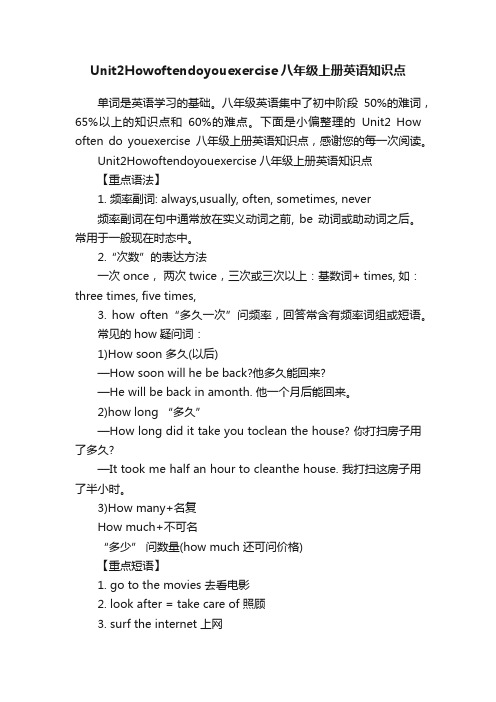
Unit2Howoftendoyouexercise八年级上册英语知识点单词是英语学习的基础。
八年级英语集中了初中阶段50%的难词,65%以上的知识点和60%的难点。
下面是小偏整理的Unit2 How often do youexercise八年级上册英语知识点,感谢您的每一次阅读。
Unit2Howoftendoyouexercise八年级上册英语知识点【重点语法】1. 频率副词: always,usually, often, sometimes, never频率副词在句中通常放在实义动词之前, be动词或助动词之后。
常用于一般现在时态中。
2.“次数”的表达方法一次 once,两次twice,三次或三次以上:基数词+ times, 如:three times, five times,3. how often“多久一次”问频率,回答常含有频率词组或短语。
常见的how疑问词:1)How soon 多久(以后)—How soon will he be back?他多久能回来?—He will be back in amonth. 他一个月后能回来。
2)how long “多久”—How long did it take you toclean the house? 你打扫房子用了多久?—It took me half an hour to cleanthe house. 我打扫这房子用了半小时。
3)How many+名复How much+不可名“多少” 问数量(how much 还可问价格)【重点短语】1. go to the movies 去看电影2. look after = take care of 照顾3. surf the internet 上网4. healthy lifestyle 健康的生活方式5. go skate boarding 去划板6. keep healthy=stay healthy 保持健康7. eating habits 饮食习惯8. take more exercise 做更多的运动9. the same as 与什么相同10. be different from 不同11. once a month一月一次12. twice a week一周两次13. make a difference to 对......有影响/作用14. most of the students=moststudents15. shop=go shopping=do someshopping 购物16. be good for 对......有益17. be bad for 对......有害18. come home from school放学回家19. of course = certainly = sure 当然20. get good grades 取得好成绩21. keep/be in good health 保持健康22. take a vacation 去度假【词语辨析】1.maybe / may bemaybe 是副词,意为“大概,可能,或许”,一般用于句首。
Unit2Howoftendoyouexercise知识点详解及练习 人教版八年级英语上册
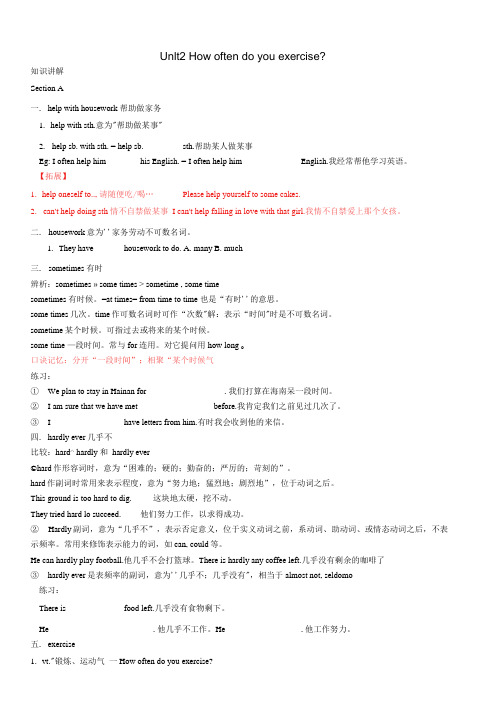
Unlt2 How often do you exercise?知识讲解Section A一. help with housework 帮助做家务1.help with sth.意为"帮助做某事"2.help sb. with sth. = help sb. ________ sth.帮助某人做某事Eg: I often help him _______ his English. = I often help him _____________ English.我经常帮他学习英语。
【拓展】1.help oneself to.., 请随便吃/喝…Please help yourself to some cakes.2.can't help doing sth 情不自禁做某事I can't help falling in love with that girl.我情不自禁爱上那个女孩。
二. housework意为''家务劳动不可数名词。
1.They have ______ housework to do. A. many B. much三. sometimes 有时辨析:sometimes » some times > sometime , some timesometimes 有时候。
=at times= from time to time 也是“有时''的意思。
some times几次。
time作可数名词时可作“次数"解:表示“时间"时是不可数名词。
sometime某个时候。
可指过去或将来的某个时候。
some time —段时间。
常与for连用。
对它提问用how long o口诀记忆:分开“一段时间”;相聚“某个时候气练习:①We plan to stay in Hainan for _________________ .我们打算在海南呆一段时间。
人教版八年级上册英语知识点梳理Unit 2 How often do you exercise
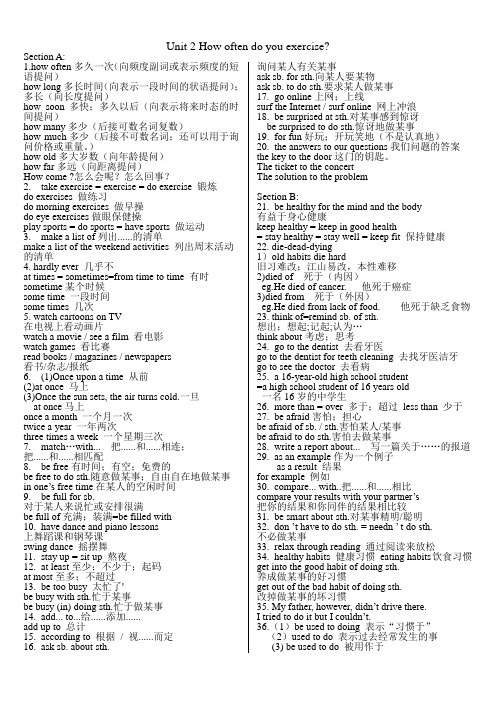
Unit 2 How often do you exercise?Section A:1.how often多久一次(向频度副词或表示频度的短语提问)how long多长时间(向表示一段时间的状语提问);多长(向长度提问)how soon多快;多久以后(向表示将来时态的时间提问)how many多少(后接可数名词复数)how much多少(后接不可数名词;还可以用于询问价格或重量。
)how old多大岁数(向年龄提问)how far多远(向距离提问)How come ?怎么会呢?怎么回事?2. take exercise = exercise = do exercise 锻炼do exercises 做练习do morning exercises 做早操do eye exercises做眼保健操play sports = do sports = have sports 做运动3. make a list of列出......的清单make a list of the weekend activities 列出周末活动的清单4. hardly ever 几乎不at times = sometimes=from time to time 有时sometime某个时候some time 一段时间some times 几次5. watch cartoons on TV在电视上看动画片watch a movie / see a film 看电影watch games 看比赛read books / magazines / newspapers看书/杂志/报纸6. (1)Once upon a time 从前(2)at once 马上(3)Once the sun sets, the air turns cold.一旦at once马上once a month 一个月一次twice a year 一年两次three times a week 一个星期三次7. match…with... 把......和......相连;把......和......相匹配8. be free有时间;有空;免费的be free to do sth.随意做某事;自由自在地做某事in one’s free time在某人的空闲时间9. be full for sb.对于某人来说忙或安排很满be full of充满;装满=be filled with10. have dance and piano lessons上舞蹈课和钢琴课swing dance 摇摆舞11. stay up = sit up 熬夜12. at least至少;不少于;起码at most至多;不超过13. be too busy 太忙了'be busy with sth.忙于某事be busy (in) doing sth.忙于做某事14. add... to...给......添加......add up to 总计15. according to 根据/ 视......而定16. ask sb. about sth. 询问某人有关某事ask sb. for sth.向某人要某物ask sb. to do sth.要求某人做某事17. go online上网;上线surf the Internet / surf online 网上冲浪18. be surprised at sth.对某事感到惊讶be surprised to do sth.惊讶地做某事19. for fun好玩;开玩笑地(不是认真地)20. the answers to our questions我们问题的答案the key to the door这门的钥匙。
北师大八年级上Unit_2_How_often_do_you_exercise 知识点总结(教案)
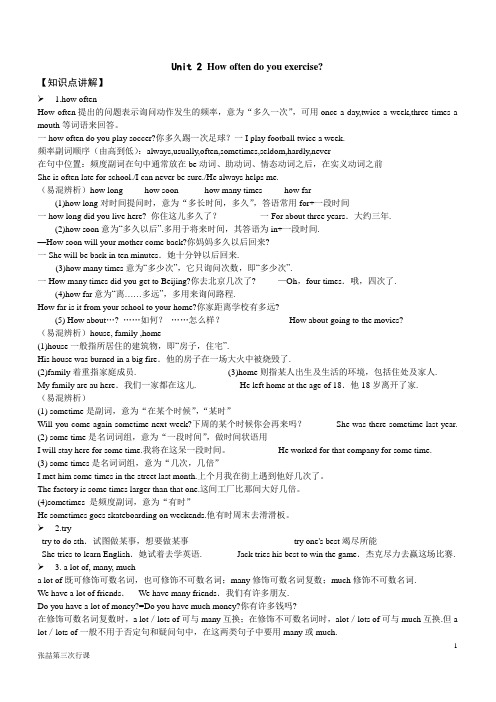
Unit 2 How often do you exercise?【知识点讲解】1.how oftenHow often提出的问题表示询问动作发生的频率,意为“多久一次”,可用once a day,twice a week,three times a mouth等词语来回答。
一how often do you play soccer?你多久踢一次足球?一I play football twice a week.频率副词顺序(由高到低):always,usually,often,sometimes,seldom,hardly,never在句中位置:频度副词在句中通常放在be动词、助动词、情态动词之后,在实义动词之前She is often late for school./I can never be sure./He always helps me.(易混辨析)how long how soon how many times how far(1)how long对时间提问时,意为“多长时间,多久”,答语常用for+一段时间一how long did you live here? 你住这儿多久了?一For about three years.大约三年.(2)how soon意为―多久以后‖.多用于将来时间,其答语为in+一段时间.—How soon will your mother come back?你妈妈多久以后回来?一She will be back in ten minutes.她十分钟以后回来.(3)how many times意为―多少次‖,它只询问次数,即―多少次‖.一How many times did you get to Beijing?你去北京几次了? —Oh,four times.哦,四次了.(4)how far意为―离……多远‖,多用来询问路程.How far is it from your school to your home?你家距离学校有多远?(5) How about…? ……如何?……怎么样?How about going to the movies?(易混辨析)house, family ,home(1)house一般指所居住的建筑物,即―房子,住宅‖.His house was burned in a big fire.他的房子在一场大火中被烧毁了.(2)family着重指家庭成员. (3)home则指某人出生及生活的环境,包括住处及家人.My family are au here.我们一家都在这儿. He left home at the age of 18.他18岁离开了家.(易混辨析)(1) sometime是副词,意为“在某个时候”,“某时”Will you come again sometime next week?下周的某个时候你会再来吗?She was there sometime last year.(2) some time是名词词组,意为“一段时间”,做时间状语用I will stay here for some time.我将在这呆一段时间。
八年级英语上册 Unit 2 How often do you exercise?单元知识归纳.doc
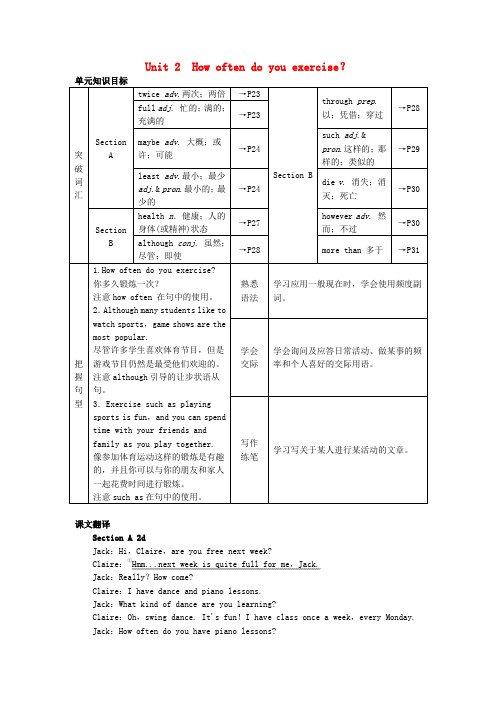
Unit 2 How often do you exercise?课文翻译Section A 2dJack:Hi,Claire,are you free next week?Claire:①Hmm...next week is quite full for me,Jack.Jack:Really?How come?Claire:I have dance and piano lessons.Jack:What kind of dance are you learning?Claire:Oh,swing dance. It's fun!I have class once a week,every Monday.Jack:How often do you have piano lessons?Claire:Twice a week,on Wednesday and Friday.Jack:Well,how about Tuesday?Claire:Oh,I have to play tennis with my friends.But do you want to come?Jack:Sure!,杰克:你好,克莱尔,下周你有空吗?克莱尔:呣……下周我很忙,杰克。
杰克:真的吗?怎么会那样?克莱尔:我上舞蹈课和钢琴课。
杰克:你学习的是什么舞蹈?克莱尔:噢,摇摆舞。
很有趣!我一周上一次课,每周一上课。
杰克:你多久上一次钢琴课?克莱尔:一周两次,在周三和周五。
杰克:噢,周二怎么样?克莱尔:哦,我要与朋友打网球。
你想来参加吗?杰克:当然了!知识详解1.How often do you exercise?你多久锻炼一次?【解读】本句是含有特殊疑问词how often 的特殊疑问句。
【解读】how often 多久一次,用于对动作发生的频率进行提问。
回答应该是频度副词或表示频率的词组,如always,usually,often,sometimes,hardly,ever,never,every day,once a week,three times a day等。
2019八年级英语上册 Unit 2 How often do you exercise讲义+习题 (新版)人教新目标版

Unit2. How often do you exercise每天她都遛狗。
I should eat less food and take more exercise.9.子某事最好的方法”,其中e great progress.g, he knows a lot.) forty classes every week.Unit 2 How often do you exercise?一.单项选择(25分)1.---The best way to make progress(取得进步) is ______ practice.---I think so.A. WithB. AcrossC. InD. Through2.---Are all of your friends late for your birthday party?---No, ______ of them are late. They come to the party early.A. SomeB. AnyC. NoneD. Few3.The woman ______ leaves her house, because she can’t walk far.A. UsuallyB. EverC. HardlyD. Always4.This book is ______ of pictures. It’s fit(适合) for children.A. DifferentB. RealC. PopularD. Full5.Don’t eat too much junk food. It’s bad for your ______.A. Mouth B, mind C. Health D. Head6.It’s raining hard now. ______, I still want to shopping with my friends.A. SoB. BecauseC. HoweverD. Then7.Mike got ninety-eight ______ and he did best in the math test.A. PointsB. HoursC. MinutesD. Money8.It’s ______ 12 o’clock. Let’s go home to have lunch.A. StillB. AlmostC. OnlyD. Usually9.---Excuse me. Could you tell me the ______ of the football game last night?---Of course I can. We got the first place.A. ResultB. DifferenceC. StoryD. Rule10.I try to eat junk food only once a month ______ I love it.A. SoB. AlthoughC. IfD. But11.---What does your mother do?---She’s a(n) ______. She works in a hospital.A. ActressB. WriterC. TeacherD. Dentist12.David is interested in sports, ______ basketball, tennis and ping-pong.A. Such asB. Because ofC. All in allD. Lots of13.Don’t worry. The little animals can’t ______ from the cold, because people look after them well in winter.A. DieB. StopC. WakeD. Blow14.---Why do you feel so tired today?---Oh, I slept ______ five hours last night.A. Less thanB. Many moreC. More thanD. Many less15.My daughter plays the piano ______, usually on Monday and Wednesday.A. Once a weekB. Twice a weekC. Once a monthD. Twice month16.Everyone needs to have ______ eight hours’ sleep at night.A. At leastB. At lastC. At allD. At home17.---_______ does she practice the guitar?---Every day.A. How longB. How farC. How manyD. How often18.---What does Nancy usually do after school?---______.A. She has piano lesson on MondayB. Her favorite sport is swimmingC. She usually goes swimmingD. She thinks it’s interesting19.---_______?---Twice a week.A. How do you like the InternetB. How many times do you use the Internet a weekC. What time do you use the InternetD. What do you usually do on the Internet21.She is ______girl.She always gets good grades.A.such a clever B.s o a cleverC.such clever a D.so clever22.______Mum asked me to close the door,______I forgot to do so.wA.Though;but B.Although;butC.But;/ D Although;23.Though he eats many vegetables to keep______,he is in bad______.A.health;health B.healthy;healthyC.healthy;health D.health;healthy24.Do you think the best way to relax is ______ exercise?A.though B.throughC.over D.across25.It's very cold today.Please keep the door______A.close B.closedC.open D.opened二.阅读理解ARunning is more popular these days. Many of us run for our health. Doctors say many health problems come from these bad habits: eating and drinking too much, smoking(吸烟) and not taking enough exercise. Doctors tell us, "Eat and drink less, don't smoke, and exercise more."Running is a kind of exercise because it helps build a healthy body. It also helps most people become(变得) thin. One 68-year-old woman runs three times a week. "I love eating," she says. She runs to become thin.Running is good for our health in other ways, too. Many runners say running keeps colds and other small health problems away. "Running is my doctor," says one man.Running can also help people to relax. So today men and women of all ages enjoy running.1.Many people enjoy running because they want to______.A. Eat muchB. Keep healthyC. Run fastD. Save time2.Doctors tell us______.A. Not to smokeB. Not to exerciseC. To drink muchD. To eat much3.How often does the old woman run?A. Twice a weekB. Three times a weekC. Once a monthD. Three times a month4.The third paragraph shows______.A. running helps people to relaxB. people who like running have many healthy problemsC. running helps build a healthy bodyD.people who like running have fewer healthy problems5.The writer mainly(主要) tell us______.A. how to runB. How to become thinC. running is a good way to keep healthyD.running is better than doctors三.任务型阅读Joy loves instant noodles (方便面). She eats them at least once a week. She has a way to makethem more delicious. She writes:“Although I know it is not good for me to eat a lot, I still lov e instant noodles — I think theyarecheap and delicious. When I cook them, I often add (加) something to make them more delicious.”“I discard (丢弃) their flavorings (调味品).I make the ‘flavoring’ myself. When I cook the noodles, I always put an egg in the m. I love eggs.They are one of my favorites. Sometimes I put some pieces of meat. I also put some vegetables, sometimes cabbages and sometimes broccoli. Yesterday I tried tomatoes. They tasted great! Next time I’d liketo try some beans. After I enjoy in stant noodles, I often go for a walk in the park. I feel great.”1. How often does Joy eat instant noodles?She eats them at least .2. What does Joy think of instant noodles?She thinks they are .3. How does Joy deal with (处理) the flavorings of instant noodles? She always , and makes the “flavoring” herself.4. What does Joy always put in instant noodles?She always puts in them.5. Where does Joy often go for a walk after enjoying instant noodles?She often goes for a walk after enjoying instant noodles.四.用所给动词的正确形式填空(5分)1. You should _______(go) to see a doctor.2. Mother asked me ________(get) up early.3. Let’s _______(try) ou r best to make our world more beautiful.4. He ________(leave) his bag at school yesterday.5. ---I found it difficult _______________(get) to sleep in the night.--- You’d better_____________________(take) some sleeping pills.五、.句型转换(10分)1.You should write him a letter.(就划线部分提问)__________ _________ _________do?2. I think you should finish your homework first.(改为否定句)________ ________ ________ you should finish your homework first3. I visit my grandma once a week.(就划线部分提问)__________ _________ do you visit your grandma?4. I met my English teacher last night.(改为一般疑问句)________ ________ ________your English teacher last night?5. He has some money ,too.(改为否定句)He ________ ________ ________money, ________.六.书面表达(满分15分)根据下列班级活动调查表,用英语写一篇短文。
2019秋季八年级英语上册Unit2Howoftendoyouexercise

预习检测
翻译下列短语
1. 去看电影 _g_o__to__t_h_e__m__o_v_ie_s_ 2. 在周末 o_n__w__e_e_k_e_n_d_s 3. 几乎不; 很少 __h_a_r_d_l_y__e_v_e_r_ 4. 每周五次 _f_i_v_e__ti_m__e_s_a__w__e_e_k___ 5. 每月两次 _t_w__ic_e__a_m__o_n__t_h_ 6. 大多数人 _m__o_s_t_p_e_o_p__le_ 7. 活动调查 _a_c_t_iv_i_t_y_s_u__r_v_e_y 8. 至于; 关于 ___a_s__f_o_r__ 9. 去购物 _g_o__s_h_o_p_p__in__g_ 10. 看电视 __w_a_t_c_h__T__V___
2020/5/9
be good/ bad for health
cola
2020/5/9
be good/ bad for health
2020/5/9
be good/ bad for health?
2020/5/9
be good/ bad for health?
2020/5/9
be good/ bad for health?
goes to the movies 2020/5/9
-What do they usually do on weekends? -She/He usually +s...on weekends. swims
shops
2020/5/9
watches TV reads a book
2020/5/9
2020/5/9
Section B: Notes
1. Mom wants me to drink it. want to do sth. 想要做某事 want sb. to do sth. 想要某人做某事 Do you want to go to the movies with me? 你想和我一起去看电影吗?
- 1、下载文档前请自行甄别文档内容的完整性,平台不提供额外的编辑、内容补充、找答案等附加服务。
- 2、"仅部分预览"的文档,不可在线预览部分如存在完整性等问题,可反馈申请退款(可完整预览的文档不适用该条件!)。
- 3、如文档侵犯您的权益,请联系客服反馈,我们会尽快为您处理(人工客服工作时间:9:00-18:30)。
【精选】2019八年级英语上册Unit 2 How often do you exercise(语法篇)试题(新版)人教新目标版练习2 语法篇_______________________________________________________________________________ __________________________________________________________________________________ ___学生通过本讲学习,能够掌握本单元的重点语法,并在综合能力上有一定的拓展。
频率副词的使用用法几个频率副词的用法★alwaysalways 意为“总是”,与进行时态连用时,可以表示赞扬,也可以表示讨厌等感情色彩。
e.g.(1)I shall always remember my first day at school. 我将永远记住我上学的第一天。
(2)He is always smoking. 他总是抽烟。
★usuallyusually可以指通常的动作,但是侧重已经形成的习惯,它是从已经形成的角度来说明动作。
e.g.(1)I usually do some shopping with my parents on Sundays. 我经常在星期天和我的父母一起去买东西。
(2)He usually goes to school by bike. 他通常骑自行车上学。
★oftenoften是指经常性的动作,意思为“常常, 经常”。
e.g.(1)Children don't often do homework. 孩子们经常不写作业。
(2)He is often late for school. 他经常上学迟到。
★sometimessometimes意思为“有时,不时”,表示次数较少(低于often所表达的次数),常常与一般现在时或一般过去时连用。
e.g.(1)Sometimes he goes to work by bike, and sometimes he goes by bus.有时候他骑自行车上班,有时候他乘公共汽车上班。
(2)Sometimes I helped my parents in the house. 有时候我帮助父母做家务。
★hardlyhardly意思为“难得, 几乎从来不”,它所表示的次数非常少。
e.g.(1)He hardly drinks. 他几乎不喝酒。
(2)She hardly plays cards. 她几乎不打牌。
★nevernever意思为“决不, 从未”,表示一次也没有。
e.g.(1)He never lives there. 他从来都没有在那儿住过。
(2)She never has anything to do. 她一向无所事事。
模糊频率副词以下些词都是表示事情发生频率的副词,也是不准确地说某事在一段时间内发生的次数。
always 总是usually 通常often 经常sometimes 有时hardly ever 几乎never 从来不always > usually > often > sometimes > hardly ever > never。
请看下面的图解:100% 70—80% 60-70% 30-40% 0精确的频率副词以下这些频率副词可以准确地表达事情发生的频率。
一次 once 两次 twice 三次 three times四次 four times 五次 five times 六次 six times注意:在记忆时,我们只要记住once(一次)和twice(二次)就可以了。
其他发生次数只要用“数字+times”来表达就可以了。
例如:I drink milk and eat vegetables every day. 我每天喝牛奶,吃疏菜。
I exercise once a week. 我每周锻炼一次。
I eat McDonald’s twice a month. 我一个月吃两次麦当劳。
I visit my grandmother four times a year. 我一年去看奶奶四次。
其他的表达法:every day 每天once a week一周一次twice a month一个月两次four times a year 一年四次once two weeks两周一次twice three months三个月两次1. Does Alice often work until 2 a.m.?-No, she ________ does.A. nearlyB. certainlyC. seldomD. always2. –I didn’t know you take a bus to school.-Oh, I ______ take a bus, but it is snowing today.A. hardlyB. neverC. sometimesD. usually3. -Were you often late for school last term, Tom?-No, _______. I got to school early every day.A. AlwaysB. UsuallyC. SometimesD. Never4. -John sings so well. Has he ever been trained?-No. He learns all by himself. He ________ goes to any training class.A. usuallyB. oftenC. neverD. even6. --- does your mother go for a walk?--- Every afternoon.A. How longB. How muchC. How oftenD. How many 解析:1. 根据句意,回答应该是她很少这样,故答案选C。
2. 本句句意是我很少坐公交上学,但是今天下雪,所以才坐公交,故选B。
3. 本句句意为我从不迟到,我每天都上学很早,故选D。
4. 本句句意为他自学的,他从来没上过培训班,故选C.5. 因为回答的是每天下午,因此是问频率,所以选C。
基础演练一、单项选择(共5小题;共5.0分)1. Lily goes shopping because she thinks the shops are crowded.A. alwaysB. hardlyC. usuallyD. often2. --- does your mother go for a walk?--- Every afternoon.A. How longB. How muchC. How oftenD. How many3. Lucy is a good student. SheA. usuallyB. hard everC. sometimesD. never4. --- Are you late for class?--- .A. Yes, neverB. Yes, sometimesC. No, everD. No, usually5. --- How often does your brother use the Internet?--- .A. Last weekB. Twice a weekC. About a weekD. One weekB二、选词填空(句子选词填空)(共5小题;共5.0分)always every day often sometimesnever hardly ever6. He gets up at six o'clock, seven days a week.7. How do you go to the movies?8. It rains here. It's usually sunny and warm.9. Some of my friends exercise every day and hardly ever eat junk food, but most of them eat junk food .10. I can't swim. So I go to the beach to swim. Sometimes I go there with my friends to run.答案一、单项选择1. B2. C3. D4. B5. B二、选词填空(句子选词填空)6. always7. often8. hardly9. every day10. never巩固提高1. He goes swimming twice a week. (就划线部分提问)does he go swimming?2. Linda has to learn more about healthy habits. (改为一般疑问句)Linda m ore about healthy habits?3. Maybe he is in the bedroom. (改为同义句)He in the bedroom.4. They use the Internet in their free time. (就划线部分提问)they in their free time?5. She sleeps eight hours every night. (就划线部分提问)hours she sleep every night?6. Mr. King usually watches TV in the evening. (就划线部分提问)Mr. King usually in the evening?7. My mother goes shopping on weekends. (用last weekend改写)My mother last weekend.8. My favorite sport is baseball. (就划线部分提问)your sport?9. His parents go to the cinema once a week. (改为同义句)His parents go to the cinema a month.10. Tom goes to bed at ten in the evening. (改为否定句)Tom to bed at ten in the evening.11. They go to the movies twice a month. (就划线部分提问)they go to the movies?1. How often2. Does, have to learn3. may be4. What do,do5. How many,does6. What does,do7. went shopping8. What's,favorite9. four times10. doesn't go11. How often dosometimes sometime some times some time1. I will stay here for .2. Tom went back home last month.3. I met him in the street last month.4.how often how far how long5. --- do you go fishing?--- Every day.6. is it from your home to school?7. does it take you to finish your homework?1. some time2. sometime3. some times4. Sometimes5. How often6. How far7. How long二、完形填空 John is pretty healthy. He 1 2 school. His3 habits are pretty good. He eats4 vegetables. He eats fruit and drinks milk every day. He5 drinks coffee. Of course, he6 loves junk food, but he tries to eat7 only once a week. Oh, and he sleeps nine8 every night. So you see, he looks after9 health. And his healthy lifestyle helps him get good grades. Good food and exercise help him to study 10 .1. A. exercise B. exercises C. exercised D. exercising2. A. to B. from C. for D. back3. A. eating B. eat C. ate D. eats4. A. a lot B. lot of C. a lot of D. a lots of5. A. always B. often C. usually D. never6. A. also B. too C. either D. very7. A. them B. its C. it D. they8. A. hours B. minutes C. days D. hour9. A. my B. he C. him D. his 10.A. goodB. betterC. bestD. the betterBBACD ACADB__________________________________________________________________________________________________________________________________________________________________八一中学期中考试三、阅读理解(共12小题;共24.0分)A28. There is a to Town Hall Station.A. trainB. busC. planeD. taxi29. Sydney Tower opens at .A. 8:00 a.m.B. 9:00 a.m.C. 10:30 p.m.D. 11:30 p.m.30. If an adult and two children go to visit Sydney Tower, they have topay .A. $60B. $90C. $120D. $150BTime is important when you are invited to be a guest in England. It's not polite to arrive earlier. Because the hostess(女主人) can't do everything welland it may make her embarrassed. It's best to arrive ten minutes later. You should say sorry when you are half an hour later.You shouldn't leave so late. If you are invited in the evening, you can leave from 10 to 11 at night. You can also chat with the host(主人) for an hour after dinner and then leave. If the host asks you to stay for a few more days, you should buy some flowers for the hostess before you leave. That can make her happy.On the second day after you leave, you should write a letter to show your thanks. And you'd better send some presents like chocolates or flowers to the hostess.31. What is not polite if you are invited to be a guest in England?A. To arrive earlierB. To send presentsC. To send a letterD. To talk to the host32. Buying some flowers for the hostess can make her .A. embarrassedB. angryC. sadD. happy33. The passage is mainly about how to be a in England.A. studentB. hostC. hostessD. guestCSometimes you should visit a doctor if you are sick. If you are not feeling well for more than a week or ten days, you should see a doctor. If you have a very high fever, you should see a doctor. If your arm or leg hurts, see a doctor. If you cannot see a doctor right away, you may want to talk to the school nurse.A visit to the doctor might seem scary at first. Just remember this. The doctor's job is to find out what is wrong and to make you feel better. Firstthe doctor will ask you to talk about what's troubling you. He or she may askif you have had this illness before. When you talk to the doctor, try to be as exact as possible. That will help the doctor find out what is wrong.Sometimes the doctor has to test your blood or other things. When the tests are finished, the doctor will tell you what is wrong with you. The doctor mayor may not give you medicine.No matter what the doctor tells you to do, follow the directions exactly. Take all your medicine. Get enough rest. Eat the foods the doctor tells you to eat. Soon after, you will start to feel better.34. When you are ill and cannot see a doctor right away, you may talk toyour .A. parentsB. classmatesC. teachersD. school nurse35. When you see a doctor, first he or she will let you .A. take some testsB. take care of yourselfC. talk about your troubleD. talk about the food you eat36. The best title for the passage is .A. A Visit to the DoctorB. Taking Care of YourselfC. Doctors at WorkD. Taking Some MedicineDI was sleeping soundly last night when I was awakened by someone'sgroans(呻吟). I listened, and heard it was from Sam, a student from Africa. I really wanted to go on sleeping, as I had insomnia(失眠) and had just fallen asleep, but I couldn't because Sam groaned louder and louder, showing he was seriously ill.Things went contrary(相反) to our wishes. Sam's condition developed from bad to worse. We telephoned the emergency service, and in no time an ambulance stopped in front of our gate. We helped the medical workers carry Sam to the vehicle, and then both Robbie and I got in and took Sam to the hospital.We helped him go through many medical examinations. After all kinds of tests, we were told that the final diagnosis(诊断) was appendicitis(盲肠炎). Luckily, Sam didn't need an operation because we brought him to the hospital in time. He got timely treatment.After Sam felt much better, we rushed back to prepare ourselves for the class. We were a little tired, but we had certainly done something good, something right.37. Why couldn't the writer go on sleeping that night?A. Because he was too excited that dayB. Because his roommates were watching football games on TVC. Because one of his roommates was sick and groaningD. Because he was sick38. Why didn't Sam need an operation?A. Because Sam didn't have enough money for an operationB. This article doesn't tell us the reasonC. Because Sam was much afraid of having an operationD. Because Sam was sent to the hospital in time39. Which of the following statements is NOT true according to the passage?A. Sam, Robbie and the writer lived in the same roomB. Sam was feeling very well after taking some pillsC. Robbie and the writer also went to the hospitalD. Robbie and the writer didn't sleep after they cam back from the hospital四、短文7选5(共4小题;共8.0分)At school many things happen to us. We may feel excited when we havesuccess in a school play. 40. we want to keep the memory(记忆) for the rest of our lives.How to keep the memory? Our English teacher, Miss Wang, has taught us agood way of remembering things—to make our own yearbook. What is a yearbook? 41. It's usually made at the end of the year.Last December, we began to make our yearbook. 42. Thensome students interviewed them, some wrote down their stories, others tookphotos of them. 43. Finally, our teacher helped us to put the things together. We had our first yearbook.All of us put a lot of love into making the yearbook. It is so wonderfulthat not only the students but also our parents and teachers will remember that special time forever.A. A yearbook is a kind of book which is used to keep the memory of excitingmoments.B. Everyone in our class had something to do to make the yearbook.C. We may feel sorry if we lose an important game.D. Our parents all like it very much.E. First we chose the persons who had done something special.五、阅读与表达(问答式)(共5小题;共10.0分)It is reported that 300 million people in China have eyesight(视力) trouble. More and more parents hope to save their children's eyesight with machine, orby correcting(改正) the ways that children read and sit. But in fact, oneshould start with the exercise on one's feet. Here are three ways to save eyes.First, don't tie(系) your shoes too closely.循环).Second, walking on tiptoes is good for one's eyesight. It can fightagainst eyesight trouble. Numbers show that most of ballet(芭蕾舞) performers' eyesight is better.Third, rope skipping (跳绳) can also be good for one's eyesight. While skipping rope, one has to move quickly, making both the brain and the eyes excited. It may also help make one grow taller.Besides foot exercises, it is good to pull one's ears. Pulling the cars 20 times quickly is also a great way. It can keep one's eyes healthy.根据短文内容,完成下列小题。
